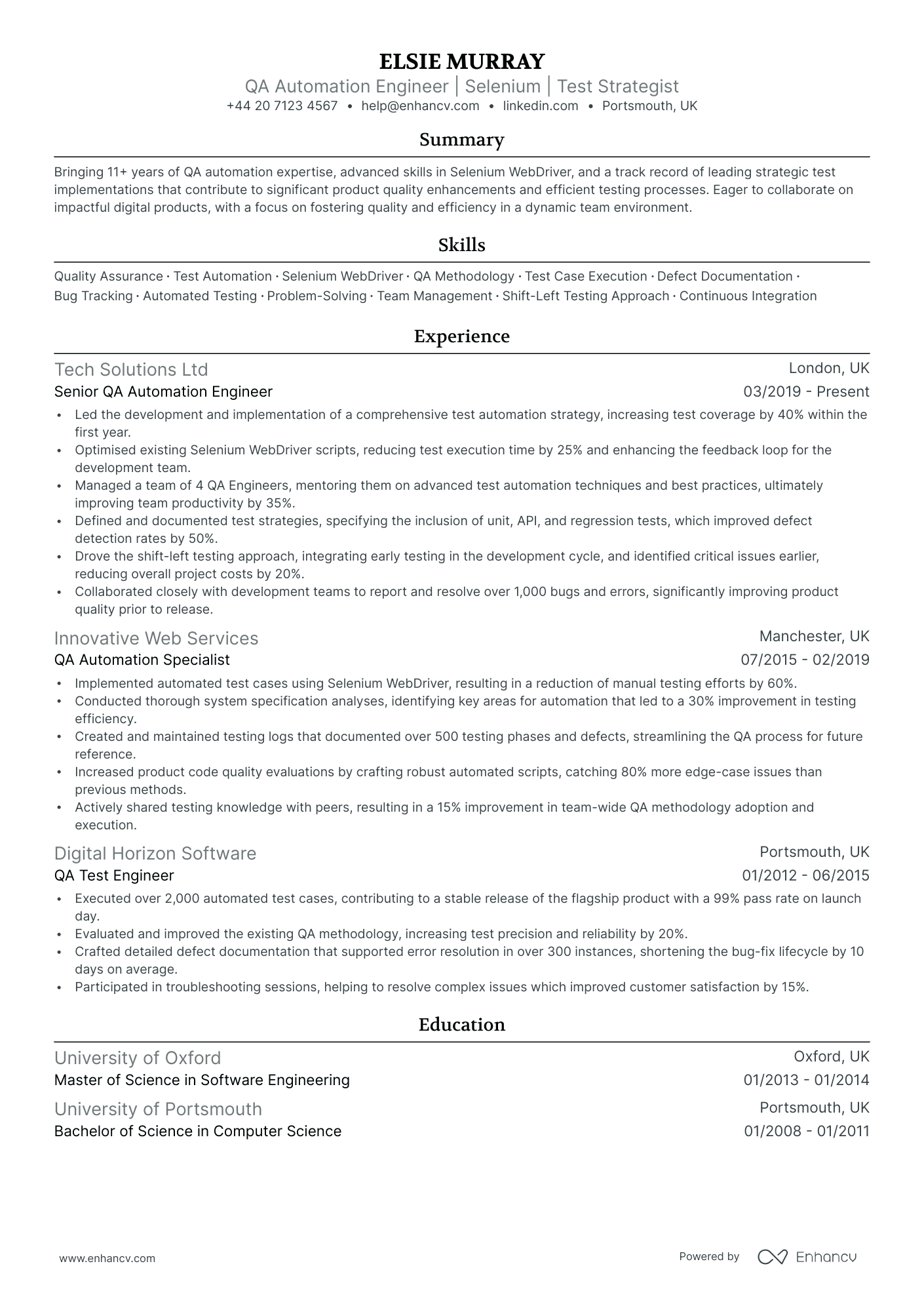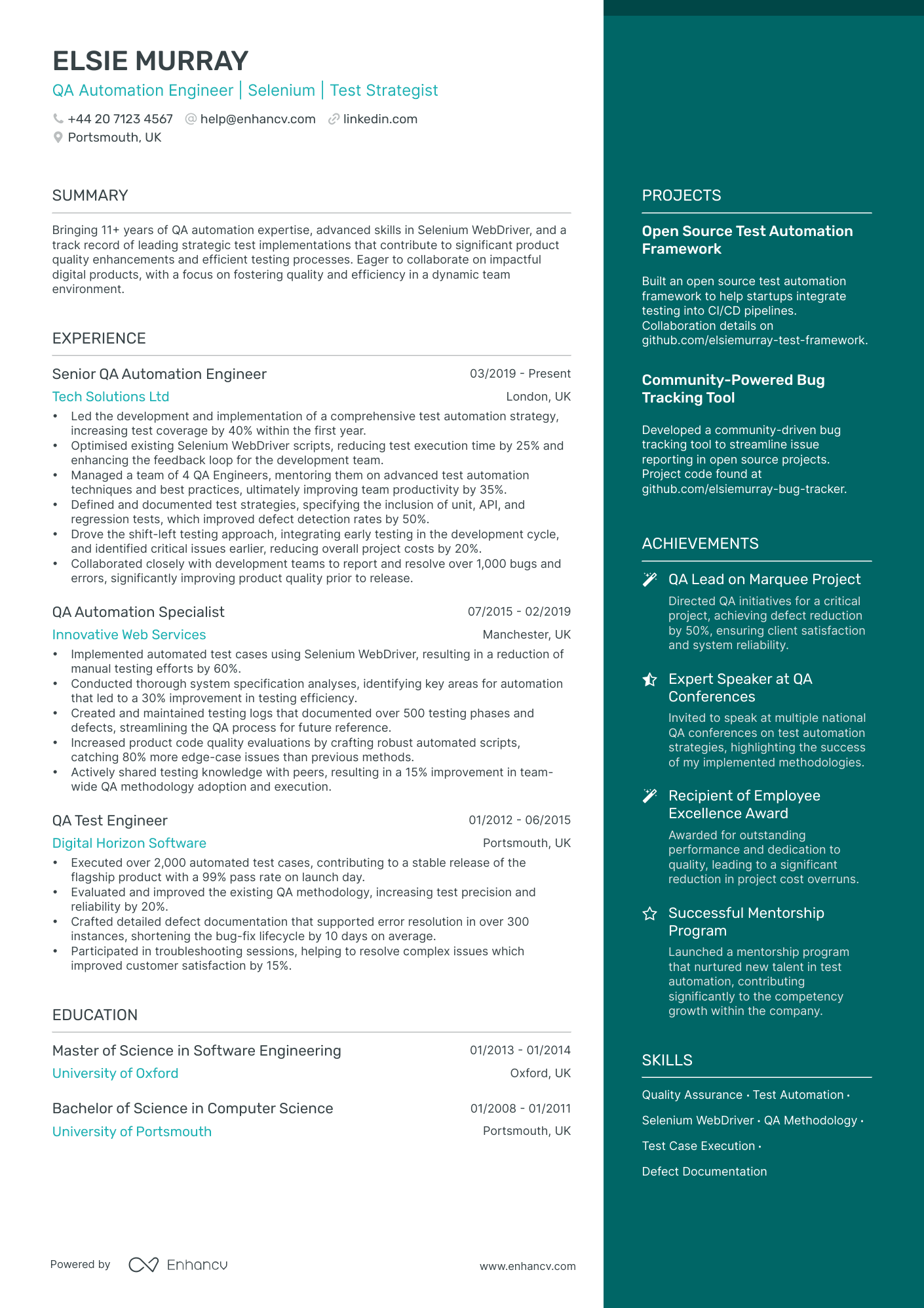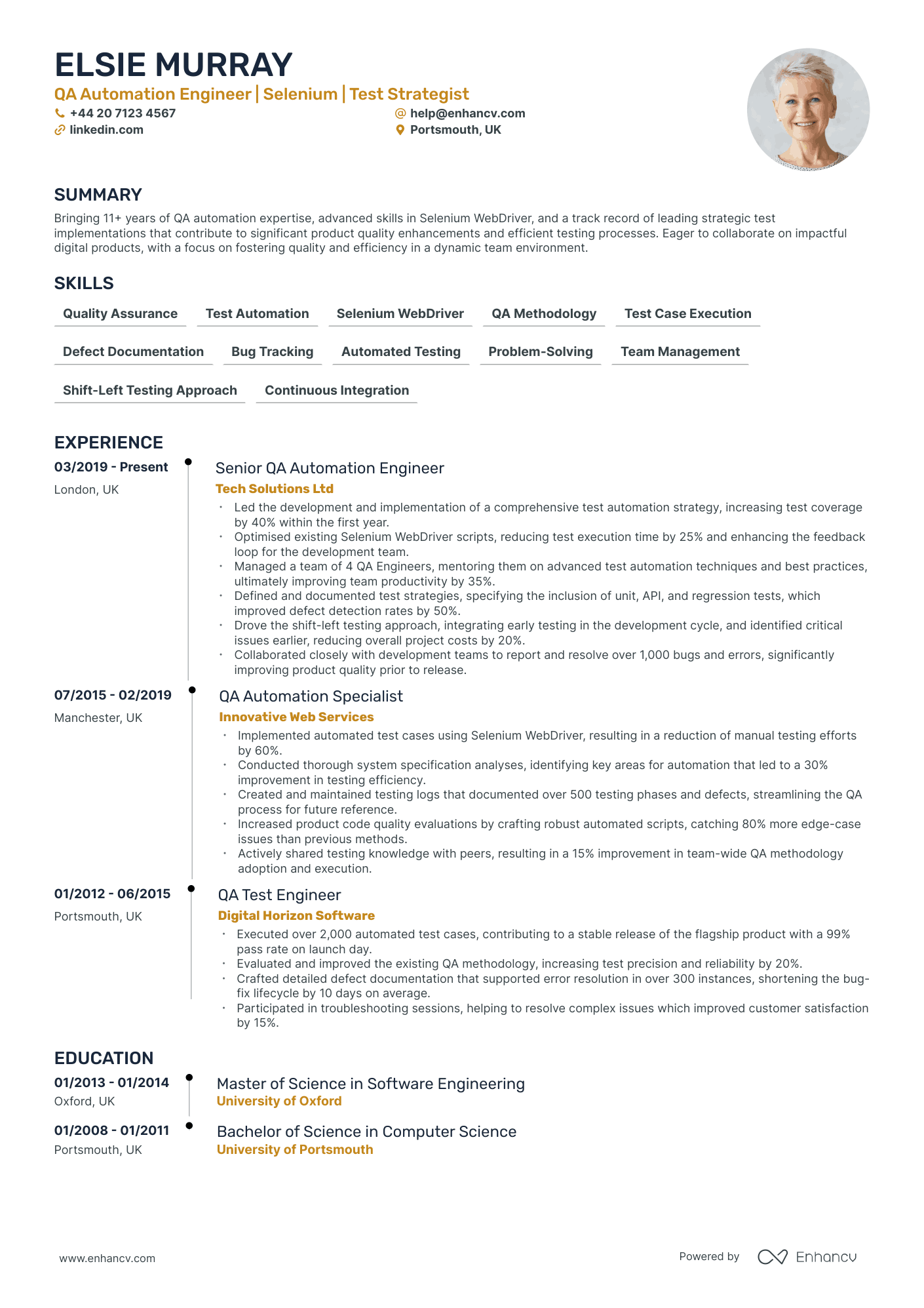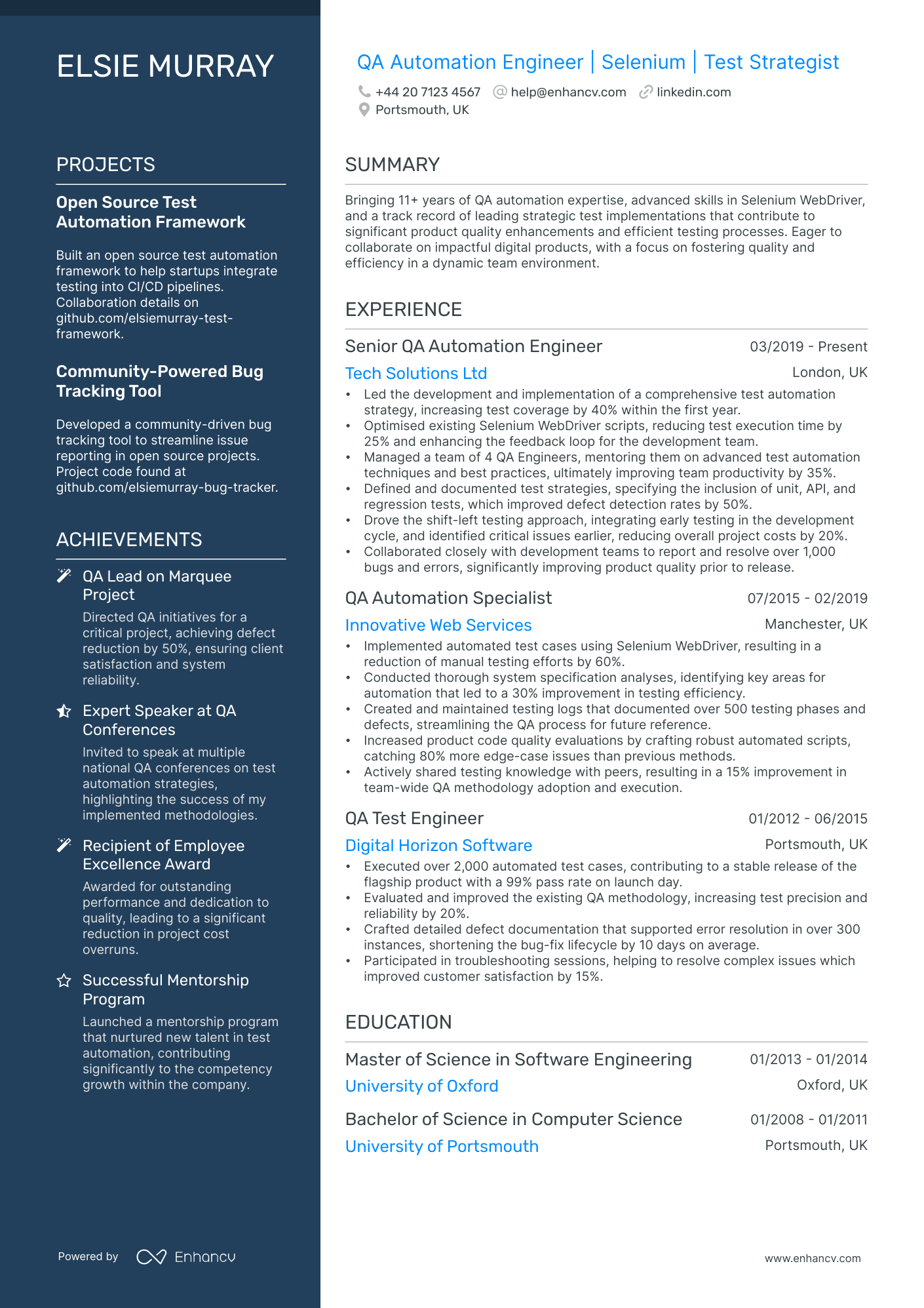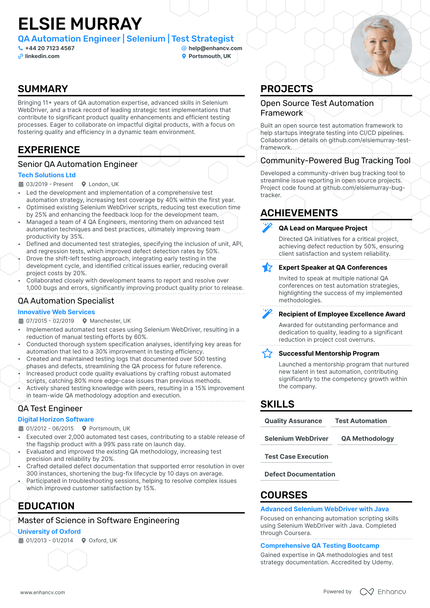Navigating the competitive job market to secure a QA tester position can be tough, with the challenge of crafting a CV that stands out to recruiters. Our guide provides invaluable insights and practical tips to enhance your CV, ensuring it highlights your expertise effectively and catches the attention of potential employers.
- Answer job requirements with your qa tester CV and experience;
- Curate your academic background and certificates, following industry-leading CV examples;
- Select from +10 niche skills to match the ideal candidate profile
- Write a more succinct experience section that consists of all the right details.
Do you need more specific insights into writing your qa tester CV? Our guides focus on unique insights for each individual role:
Structuring your qa tester CV layout: four factors to keep in mind
There are plenty of best practices out there for your CV layout and design. At the end of the day, a clear format and concise CV message should be your top priority. Use your CV design to enhance separate sections, bringing them to the forefront of recruiters' attention. At the same time, you can write content that:- Follows the reverse chronological order in the experience section by first listing your most recent jobs;
- Incorporates your contact information in the header, but do skip out on the CV photo for roles in the UK;
- Is spotlighted in the most important sections of your CV, e.g. the summary or objective, experience, education, etc. to show just how you meet the job requirements;
- Is no longer than two-pages. Often, the one-page format can be optimal for your qa tester CV.
Before submitting your CV, you may wonder whether to export it in Doc or PDF. With the PDF format, your information and layout stay intact. This is quite useful when your CV is assessed by the Applicant Tracker System (or the ATS) . The ATS is a software that scans your profile for all relevant information and can easily understand latest study on the ATS , which looks at your CV columns, design, and so much more.
PRO TIP
Incorporate a touch of colour in headers or section breaks, but keep it professional and ensure it doesn’t detract from readability, especially in more conservative industries.
The top sections on a qa tester CV
- Professional Summary highlights your QA expertise and sets the tone for your CV, emphasising your value and experience.
- Technical Skills section showcases your proficiency with testing tools, programming languages, and methodologies.
- Work Experience outlines your past roles and contributions in QA, demonstrating hands-on experience.
- Education & Certifications validate your formal training and specialized knowledge relevant to QA testing.
- Projects & Achievements display your practical impact on product quality and successful testing outcomes.
What recruiters value on your CV:
- Highlight your experience with various testing methodologies, such as Agile or Waterfall, and specify the types of testing you are proficient in, like functional, regression, and performance testing.
- Emphasise your knowledge and hands-on experience with testing tools relevant to Quality Assurance (QA), including both automated and manual testing tools, such as Selenium, JIRA, and TestRail.
- Mention any notable bugs or errors you discovered in previous roles, and describe how your attention to detail and problem-solving skills contributed to the quality of the final product.
- Detail your experience in writing clear and concise test cases, test plans, and bug reports, showcasing your ability to communicate effectively with both technical and non-technical team members.
- Include any relevant certifications or ongoing professional development in the field of software testing, such as ISTQB certification, to demonstrate your commitment to staying current in QA methodologies and best practices.
Recommended reads:
How to present your contact details and job keywords in your qa tester CV header
Located at the top of your qa tester CV, the header presents recruiters with your key personal information, headline, and professional photo. When creating your CV header, include your:
- Contact details - avoid listing your work email or telephone number and, also, email addresses that sound unprofessional (e.g. koolKittyCat$3@gmail.com is definitely a big no);
- Headline - it should be relevant, concise, and specific to the role you're applying for, integrating keywords and action verbs;
- Photo - instead of including a photograph from your family reunion, select one that shows you in a more professional light. It's also good to note that in some countries (e.g. the UK and US), it's best to avoid photos on your CV as they may serve as bias.
What do other industry professionals include in their CV header? Make sure to check out the next bit of your guide to see real-life examples:
Examples of good CV headlines for qa tester:
- Senior QA Analyst | ISTQB Certified | Automation & Manual Testing | 8+ Years' Experience
- Lead Software Tester | User-Centred Testing | Agile & DevOps Environments | 10 Years' Expertise
- Junior Test Engineer | Functional Testing | Keen on AI & ML Integration | 2 Years in Tech
- QA Automation Specialist | Selenium & Python | Performance Testing | 5 Years' Industry Practice
- Quality Assurance Consultant | Risk Mitigation Strategist | ISO 9001:2015 Knowledge | 12+ Years' Proficiency
- Test Manager | Strategic QA Leadership | Continuous Integration & Delivery | 15 Years' Distinguished Service
What's the difference between a qa tester CV summary and objective
Why should it matter to you?
- Your qa tester CV summary is a showcasing your career ambitions and your unique value. Use the objective to answer why your potential employers should hire you based on goals and ambitions. The objective is the ideal choice for candidates who happen to have less professional experience, but still meet some of the job requirements.
Before you select which one will be more relevant to your experience, have a look at some industry-leading CV summaries and objectives.
CV summaries for a qa tester job:
- Seasoned QA tester with 8 years of rigorous experience in a fast-paced tech environment, specialising in automated testing tools such as Selenium and JIRA. Proven track record of improving product quality by 30% through meticulous test planning and execution, recognised for leadership in guiding a team of junior testers.
- Diligent QA professional with a strong focus on user experience, bringing 6 years of in-depth knowledge of cross-functional testing methodologies, including Agile and Waterfall. Exceptionally skilled in defect tracking with Bugzilla, highlighted by a major contribution to the launch of a critically acclaimed software product.
- Former network engineer seeking to transfer a comprehensive 10-year background into software quality assurance. Acquired a robust analytical skill set that includes troubleshooting complex systems, which aligns well with the precision needed for effective test case development and test execution in a new QA career path.
- Passionate about a career transition into QA, a former data analyst with 4 years of experience in data mining and statistical analysis. Recognised for attention to detail and logical problem-solving abilities that are crucial for dissecting software requirements and isolating potential issues before they impact users.
- Entry-level enthusiast for software quality seeking to apply a fresh perspective and a strong commitment to excellence. Eager to develop expertise in test automation tools and keen on contributing to projects that enhance software reliability and user satisfaction through thorough QA processes.
- Aspiring QA tester with no formal experience but a profound interest in technology and software development. Objective: to leverage skills gained through a computer science degree and a personal portfolio of minor projects to become a meticulous and effective tester, ready to learn and grow within a dynamic testing team.
Narrating the details of your qa tester CV experience section
Perhaps you've heard it time and time again, but, how you present your experience is what matters the most. Your CV experience section - that details your work history alongside your accomplishments - is the space to spotlight your unqiue expertise and talents. So, avoid solely listing your responsibilities, but instead:
- adverts' keywords and integrate those in your experience section;
- Use your CV to detail how you've been promoted in the past by including experience in the reverse chronological order.
Before you start writing your qa tester CV experience section, dive into some industry-leading examples on how to structure your bullets.
Best practices for your CV's work experience section
- Analyse specifications and user stories to develop comprehensive test cases and scenarios, ensuring both functional requirements and user experiences are met.
- Execute various types of testing such as system, regression, UAT, and performance testing to identify software issues and ensure quality standards.
- Collaborate with the development team to reproduce and precisely document bugs and errors, utilising tools like JIRA or Bugzilla for efficient tracking and management.
- Develop and maintain automated test scripts using frameworks like Selenium or Cucumber, increasing the efficiency and coverage of regression testing cycles.
- Participate in Agile ceremonies, including daily stand-ups, sprint planning, and retrospectives, offering constructive feedback and updates on testing progress.
- Stay abreast of new testing tools and methodologies, continuously seeking to improve the test infrastructure and processes within the team.
- Prepare and maintain test documentation, including test plans, test cases, and test summaries, ensuring transparency and clear communication with the wider team.
- Advocate for quality assurance best practices throughout the software development lifecycle, contributing to the cultivation of a strong quality culture.
- Conduct exploratory testing to identify areas not covered by existing test cases, demonstrating a proactive and meticulous approach to uncovering potential issues.
- Executed comprehensive test plans for an e-commerce platform, increasing overall software quality and reducing post-launch bugs by 30%.
- Led a QA testing team in adopting Agile methodologies, reducing cycle time by 20% and improving cross-functional communication within the company.
- Pioneered the implementation of automated testing tools, reducing manual testing hours by 60% and enhancing the testing process efficiency.
- Designed and implemented robust test cases while working with a cross-functional team on the release of a new finance management application.
- Collaborated closely with the development team to identify and resolve over 150 critical bugs before product deployment.
- Mentored junior testers, improving team performance and knowledge in test automation tools by facilitating comprehensive workshops.
- Executed test scenarios for a revolutionary mobile application, ensuring compatibility across various operating systems and device models.
- Received a company award for exceptional diligence in quality assurance which enhanced the app's ratings by 25% post-launch.
- Conducted thorough regression testing after each sprint, ensuring over 95% test coverage and consistently maintaining high quality standards.
- Played a key role in a major transition to cloud-based services, ensuring zero critical issues during the migration of the customer management system.
- Established a benchmarking protocol for performance testing, which became a standard procedure for all subsequent projects.
- Facilitated collaborative bug hunting events that led to a 40% increase in early bug detections compared to previous quarters.
- Effectively communicated with international teams to coordinate QA efforts, ensuring consistency in product quality across multiple regions.
- Developed and executed SQL scripts to validate data integrity and optimize database performance, supporting back-end testing requirements.
- Created detailed test reports that provided actionable insights, leading to the prioritization of feature updates which improved customer satisfaction by 20%.
- Successfully identified critical security vulnerabilities during testing phases, preempting potential data breaches and protecting user data.
- Optimized the issue tracking system to enhance traceability of defects, resulting in an accelerated resolution time by 15%.
- Spearheaded a quality initiative that standardized test documentation across the department, leading to a more consistent and thorough QA practice.
- Instituted a code coverage measurement system that provided insights into untested code blocks, improving test coverage by over 35%.
- Contributed to a 50% reduction in user-reported issues within the first three months post-launch by implementing rigorous acceptance testing procedures.
- Enhanced the bug tracking workflow which allowed the project team to better prioritize issues, thus shortening the average bug lifespan by 25%.
- Initiated the use of Continuous Integration (CI) testing in the development pipeline, significantly reducing integration issues and deployment setbacks.
- Provided detailed test result feedback to developers, fostering a culture of quality and accountability within the project team.
- Organized a successful Quality Assurance symposium for the company, which resulted in a marked improvement in the team's understanding of industry best practices.
Lacking professional expertise: how to write your CV to highlight your best talents
Don't count on your lucky stars when you're applying for a role, where you happen to have less (or almost none) professional experience. Recruiters sometimes do hire inexperienced candidates if they're able to present their unique value from the get-go. So, instead of opting for the traditional, CV experience section:
- List any applicable expertise you happen to have - no matter if it's a part-time job, internship, or volunteer work. This would hint to recruiters that your profile is relevant;
- Focus your CV on your transferrable skills or talents you've obtained thanks to your whole life and work experience. In effect, you'll be spotlighting your value as a candidate;
- Separate more space for your applicable academic background and certificates to show you have the technical know-how;
- Ensure that within your objective, you've defined why you'll like the job and how you'll be the perfect match for it. Always ensure you've tailored your CV to individual applications.
Looking for more good examples for your first job? We'll show you how other candidates, with less professional experience, have created their job-winning CVs.
Recommended reads:
PRO TIP
If applicable, briefly mention a situation where things didn’t go as planned and what you learned from it, demonstrating your ability to learn and adapt.
Mix and match hard and soft skills across your qa tester CV
Your skill set play an equally valid role as your experience to your application. That is because recruiters are looking for both:
- hard skills or your aptitude in applying particular technologies
- soft skills or your ability to work in a team using your personal skills, e.g. leadership, time management, etc.
Are you wondering how you should include both hard and soft skills across your qa tester CV? Use the:
- skills section to list between ten and twelve technologies that are part of the job requirement (and that you're capable to use);
- strengths and achievements section to detail how you've used particular hard and soft skills that led to great results for you at work;
- summary or objective to spotlight up to three skills that are crucial for the role and how they've helped you optimise your work processes.
One final note - when writing about the skills you have, make sure to match them exactly as they are written in the job ad. Take this precautionary measure to ensure your CV passes the Applicant Tracker System (ATS) assessment.
Top skills for your qa tester CV:
Test Case Creation
Automated Testing Tools
Bug Tracking Software
Performance Testing
Security Testing
Mobile Application Testing
API Testing
SQL
Version Control Systems
Continuous Integration Tools
Analytical Thinking
Problem-Solving
Communication
Attention to Detail
Time Management
Teamwork
Adaptability
Continuous Learning
Organisational Skills
Customer Focus
PRO TIP
Order your skills based on the relevance to the role you're applying for, ensuring the most pertinent skills catch the employer's attention first.
Your university degree and certificates: an integral part of your qa tester CV
Let's take you back to your uni days and decide what information will be relevant for your qa tester CV. Once more, when discussing your higher education, select only information that is pertinent to the job (e.g. degrees and projects in the same industry, etc.). Ultimately, you should:
- List only your higher education degrees, alongside start and graduation dates, and the university name;
- Include that you obtained a first degree for diplomas that are relevant to the role, and you believe will impress recruiters;
- Showcase relevant coursework, projects, or publications, if you happen to have less experience or will need to fill in gaps in your professional history.
PRO TIP
Use mini case studies or success stories in your CV to demonstrate how your skills have positively impacted previous roles or projects.
Recommended reads:
Key takeaways
Impressing recruiters with your experience, skill set, and values starts with your professional qa tester CV. Write concisely and always aim to answer job requirements with what you've achieved; furthermore:
- Select a simple design that complements your experience and ensures your profile is presentable;
- Include an opening statement that either spotlights your key achievements (summary) or showcases your career ambitions (objective);
- Curate your experience bullets, so that each one commences with a strong, action verb and is followed up by your skill and accomplishment;
- List your hard and soft skills all across different sections of your CV to ensure your application meets the requirements;
- Dedicate space to your relevant higher education diplomas and your certificates to show recruiters you have the necessary industry background.
